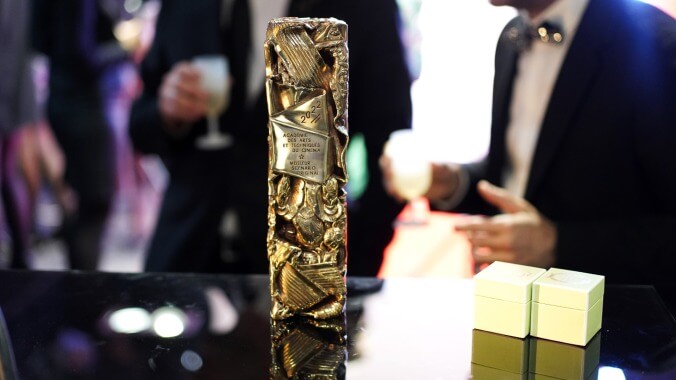In today’s “Shouldn’t that already be a rule?” news: The Cesar Awards, France’s most prestigious film competition, have formally banned anyone under investigation for sex crimes from attending the awards ceremony.
Those implicated in the new ruling include anyone who has been indicted or convicted for a sexual offense—however, the restriction only extends as far as the doors to the ceremony. Actors, directors, producers, and other creatives under investigation can still be nominated for (and win) Cesar Awards. The ruling does specify, however, that if someone facing investigation wins, “no one will be allowed to speak on their behalf” at the ceremony.
The decision arrives just as the potential for protest at the February 25 awards ceremony brewed stronger, given the longlisting of actor Sofiane Bennacer for a nomination despite an ongoing police investigation into two allegations of rape and one of violence against him. The 25-year-old actor has denied all allegations.
As awards season approached, Bennacer had courted buzz for his performance in Les Amandiers, which follows a group of sexually experimental theater students in the 1980s. After backlash, the awards removed Bennacer from the longlist of possible nominees in the Best Newcomer category. Les Amandiers’ director Valeria Bruni-Tedeschi called Bennacer’s removal a “media lynching.” Her sister, former French first lady Carla Bruni, also joined in the protest, posting on social media: “Without the presumption of innocence, all justice is random, debatable, possibly corrupt.”
The upset around Bennacer is far from the first uproar to occur at the Cesar Awards over an alleged sex criminal—in 2020, the French ceremony chose to uplift a convicted one. Large-scale protests (including a memorable ceremony walkout from French actor and activist Adèle Haenel) took place that year after Roman Polanski, who was convicted of raping a child in the 1970s, won best director for his film An Officer and a Spy.
So far, the ban only applies to this year’s ceremony. The Cesar Academy said that internal debates over barring alleged abusers from future nominations and awards still continue. The Academy indicated that a decision on that matter would arrive in the coming weeks— here’s hoping the Cesars do right by Haenel, and so many other French artists, who’ve struggled against the industry’s pervasive culture of silence.


 Keep scrolling for more great stories from The A.V. Club.
Keep scrolling for more great stories from The A.V. Club.